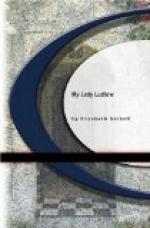I had heard so many little speeches about Mr. Gray from one person or another, all speaking against him, as a mischief-maker, a setter-up of new doctrines, and of a fanciful standard of life (and you may be sure that, where Lady Ludlow led, Mrs. Medlicott and Adams were certain to follow, each in their different ways showing the influence my lady had over them), that I believe I had grown to consider him as a very instrument of evil, and to expect to perceive in his face marks of his presumption, and arrogance, and impertinent interference. It was now many weeks since I had seen him, and when he was one morning shown into the blue drawing-room (into which I had been removed for a change), I was quite surprised to see how innocent and awkward a young man he appeared, confused even more than I was at our unexpected tete-a-tete. He looked thinner, his eyes more eager, his expression more anxious, and his colour came and went more than it had done when I had seen him last. I tried to make a little conversation, as I was, to my own surprise, more at my ease than he was; but his thoughts were evidently too much preoccupied for him to do more than answer me with monosyllables.
Presently my lady came in. Mr. Gray twitched and coloured more than ever; but plunged into the middle of his subject at once.
“My lady, I cannot answer it to my conscience, if I allow the children of this village to go on any longer the little heathens that they are. I must do something to alter their condition. I am quite aware that your ladyship disapproves of many of the plans which have suggested themselves to me; but nevertheless I must do something, and I am come now to your ladyship to ask respectfully, but firmly, what you would advise me to do.”
His eyes were dilated, and I could almost have said they were full of tears with his eagerness. But I am sure it is a bad plan to remind people of decided opinions which they have once expressed, if you wish them to modify those opinions. Now, Mr. Gray had done this with my lady; and though I do not mean to say she was obstinate, yet she was not one to retract.
She was silent for a moment or two before she replied.
“You ask me to suggest a remedy for an evil of the existence of which I am not conscious,” was her answer—very coldly, very gently given. “In Mr. Mountford’s time I heard no such complaints: whenever I see the village children (and they are not unfrequent visitors at this house, on one pretext or another), they are well and decently behaved.”
“Oh, madam, you cannot judge,” he broke in. “They are trained to respect you in word and deed; you are the highest they ever look up to; they have no notion of a higher.”
“Nay, Mr. Gray,” said my lady, smiling, “they are as loyally disposed as any children can be. They come up here every fourth of June, and drink his Majesty’s health, and have buns, and (as Margaret Dawson can testify) they take a great and respectful interest in all the pictures I can show them of the royal family.”




